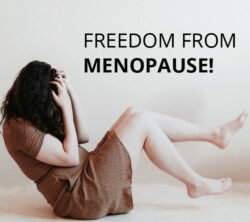
Menopause – What Is It?
Many women are suffering through menopause and doing so unnecessarily.
Menopause can be devastating. But the distress of peri- and post-menopausal suffering does not have to be inevitable! AND YOU CAN DO IT NATURALLY – without synthetic or other prescription medications.
Menopause is defined as the time marking the end of your menstrual cycle and is ‘diagnosed’ when you have gone twelve months without a menstrual period.
The average age of menopause is 51, but it can occur anytime between your forties and sixties.
Perimenopausal Symptoms – How Do You Know?
- Irregular periods
- Vaginal dryness
- Vaginal itching
- Hot flashes
- Night sweats
- Difficulty falling and/or staying asleep
- Irritability
- Mood swings
- Unexplained anxiety
- Low metabolism/weight gain
- Hair thinning or a change in texture
- Dry or loose skin
- Feeling cold or hot more easily
Post-menopausal Concerns – What Can Happen?
After menopause, your risk of certain medical conditions increases.
Cardiovascular Diseases
Post-menopausal women are more likely to have to eat less and exercise more simply to maintain their current weight (which I think is tremendously unfair!). Weight gain around the hips and belly can indicate inflammation and an increased risk of developing cardiovascular diseases.
Menopause and hormonal imbalance can increase the risk of a diseased heart or diseased blood vessels. This risk can increase further for those women who choose to replace their hormones artificially – something I would not recommend.
Studies have shown that a small amount of estrogen is necessary to protect the heart and blood vessels from cardiovascular disease. So, after the crash of estrogen levels that we experience during menopause, we need to combat this. Maintaining a healthy weight to height ratio, regular exercise, and a protein-rich diet is essential.
Bone Health
Although we start losing bone density from our late twenties onwards, after menopause, the rate of this increases. As a result, we have an increased risk of developing osteoporosis.
Post-menopausal women with osteoporosis are especially susceptible to fractures of the femur, hip, spine, and wrist.
It is critical for good bone health that we consume a diet rich in fresh fruit and vegetables. I also recommend considering supplementation to keep the necessary vitamin and mineral levels up. For more information on how to supplement correctly for bone health, you can check out my ‘natural solutions for bone health’ lecture and blog post.
Pelvic Floor Disorders
Pelvic floor disorders might include incontinence, urinary urgency, antibiotic-resistant uterine infections, pelvic organ prolapse, sexual pain, or pelvic pain syndrome.
78% of women in their sixties and above are dealing with some sort of pelvic floor disorder that is causing them discomfort and affecting their lifestyle – and they are suffering in silence.
During this course, there will be opportunities for you to learn and discuss these types of issues and get the correct help.
Loss of Sexual Function
If you are dealing with the loss of sexual function, low or no libido, decreased sensation, or total numbness of the genital region, then you might be recommended water-based vaginal moisturizers. While these can help with symptoms of discomfort, they do not address the cause. It is necessary to deal with the hormonal imbalances that are causing the loss of sexual function.
There are products available that I recommend which are 100% natural and completely safe for all women, including those women dealing with any kind of cancer who are concerned about putting estrogen into the body. Further information on what these products are, how they work, and how to access them can be found in the audio recording of this class.
HPAT Axis
HPAT refers to the hypothalamus, pituitary, adrenal, and thyroid glands. That is our essential stress response system. Imbalances in the HPAT axis of menopausal women cause increases in inflammation, decreases in immune health, and lead to most of the health issues associated with menopause.
Decreasing stress on the body – be that mental, emotional, spiritual, or chemical – and attending to great nutrition will allow the menopause to fall away!
You will start to produce small amounts of reproductive hormones – normal amounts for menopausal or post-menopausal women – and as a result, you will not suffer from the related health issues associated with menopause.
Blood Sugar
Our bodies control blood sugar with insulin, and many post-menopausal women are insulin resistant. Either the pancreas fails to produce enough insulin, or the insulin fails to provide the same glucose-lowering effect as in someone with normal metabolism.
Women who are insulin resistant are often women suffering the most severe menopausal symptoms and are most likely to be affected by cardiovascular diseases and other health issues. The cause? A lifetime of refined carbohydrates, starches, and sugars.
Stabilizing your blood sugar and insulin by taking care of your diet is critical. You need to take in a diet that is high in protein, high in fiber, and high in healthy fats.
Insulin is the master hormone! It stabilizes the HPAT axis and the reproductive hormones, so it is key to managing the menopause and maintaining excellent health throughout.
What You Know
- What menopause is
- What the perimenopausal symptoms are
- What some post-menopausal concerns are and how to manage those concerns
It may have sounded like doom and gloom thus far, but stay with me, in my next blog post on Menopause I will show you that these concerns don’t have to be your reality. I can teach you the secrets to navigating menopause with ease and freedom.
What next?
- Book a free, fifteen-minute consultation to discuss your concerns and see how we might be able to help you achieve your health care goals.
- Check out the following Dr Sandy audio downloads:
-
 Freedom from Menopause: eCourse$75.00Add to WishlistAdd to Wishlist
Freedom from Menopause: eCourse$75.00Add to WishlistAdd to Wishlist -
 Easing Menopause – Naturally$29.99Add to WishlistAdd to Wishlist
Easing Menopause – Naturally$29.99Add to WishlistAdd to Wishlist -
 Natural Solutions for Menopausal Women$25.00Add to WishlistAdd to Wishlist
Natural Solutions for Menopausal Women$25.00Add to WishlistAdd to Wishlist -
 Weight Loss and Stress Reduction in Menopause$18.99Add to WishlistAdd to Wishlist
Weight Loss and Stress Reduction in Menopause$18.99Add to WishlistAdd to Wishlist




